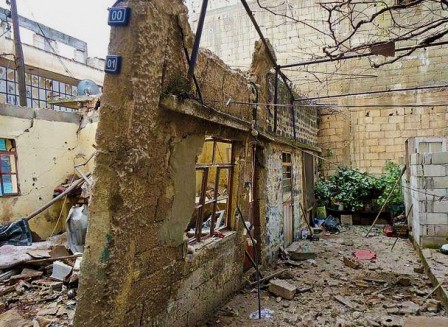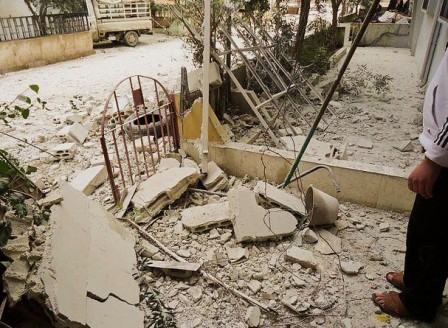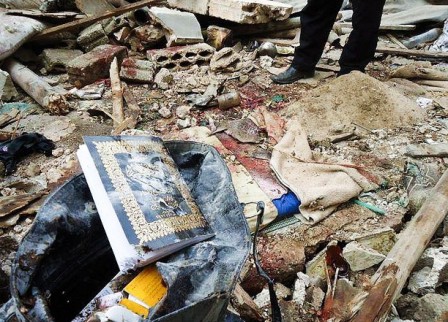Will Syria’s Civil War Spread to a Regional Sectarian War Between Sunnis and Shiites?
The regional escalation of Syria’s civil war is well on its way. On March 1, 2013, it took the form of a military intervention by Iraq against the so called Free Syrian Army (FSA), composed almost exclusively of Sunnis and backed by Qatar and Saudi Arabia with blessings of the West and assistance from Turkey. On February 28, 2013, Iraq’s Prime Minister Nouri al-Maliki (a Shiite) warned that a victory of the Syrian opposition would spread chaos through the region. Iraqi forces shelled FSA positions across the border, and Iraq is currently deploying a substantial amount of military assets near its border with Syria. Maliki’s forecast is very similar to one I made more than a year ago. “If the opposition is victorious, there will be a civil war in Lebanon, divisions in Jordan, and a sectarian war in Iraq,” said Maliki in an interview with Associated Press (AP). This turn of events highlights even more the incoherence of the Obama administration’s evaluation and handling of Syria’s civil war.
Note: Below is my original article — same title, February 19, 2012 — that forecasted the same scenario.
Nobody is contesting that Syria has entered a civil war. Despite the efforts of Russia and China, the time for negotiating and defusing the crisis by a political solution seems to be over. In the power struggle within the Assad regime, which has been unfolding ever since the start of the uprising, the hardliners, with Maher al-Assad in the lead, took control of the brutal repression over the more conciliatory side of Bashar al-Assad. In retrospect, the situation could have been prevented at an earlier stage if Syria’s two key allies (Iran and Russia) would have put enough pressure on Bashar al-Assad to get rid off his own brother, Maher, or at least minimize his role.
 This said, the situation has festered enough to have reached a point of no return. While the big regional and international players are interfering in Syria’s affairs by siding with the Assad regime or the so-called revolution, they are not addressing what should be a much bigger regional and global concern: can the civil war in Syria be contained or will it spread to surrounding countries and ignite a full-blown sectarian war between Sunnis and Shiites? While the already precarious stability of the entire region is at stake, two countries are in the “direct line of fire” of a Syrian civil war domino effect: Lebanon and Iraq.
This said, the situation has festered enough to have reached a point of no return. While the big regional and international players are interfering in Syria’s affairs by siding with the Assad regime or the so-called revolution, they are not addressing what should be a much bigger regional and global concern: can the civil war in Syria be contained or will it spread to surrounding countries and ignite a full-blown sectarian war between Sunnis and Shiites? While the already precarious stability of the entire region is at stake, two countries are in the “direct line of fire” of a Syrian civil war domino effect: Lebanon and Iraq.
The Case of Lebanon
In a recent conversation with our Lebanese contributor, Anthony Zeitouni, this issue was addressed. Zeitouni said that “Lebanon is always five minutes away from a civil war.” Indeed, the balance in Lebanon between the three communities (Shiites, Sunnis and Christians) has been extremely fragile for decades. Hezbollah’s (Shiites) main backers are the Assad regime and Iran. The likely regime change in Syria will make them much weaker, and they might be inclined to show their strength, both internally and towards Israel, while they still can. In return, Sunnis and Christians could wrongly assess that the Syrian crisis is a perfect opportunity to diminish the power of Hezbollah by attacking it. In Syria, the small Christian minority (always tolerated by the Assad regime) has already left, seeking refuge in Lebanon or preferably in Europe, Canada or the United States. But in Lebanon, the much larger Christian population could be caught in the middle of a civil war between Hezbollah and the Sunnis.
The Case of Iraq
If in Lebanon a civil war is always “five minutes away,” in Iraq the sectarian conflict between the Shiite majority and Sunni minority is ever present and hardly needs a spark to reignite it. Since the official withdrawal of the US military, the increased sectarian tensions could, at any given time, reach a boiling point. Even if Prime Minister al-Maliki’s government is officially an ally of the US, al-Maliki must perform an increasingly tricky balancing act with Iran. Maliki has also to deal with the increasing power of the charismatic cleric al-Sadr, who is closely aligned with Tehran. In any case, sectarian issues (al-Maliki is a Shiite) would quickly supersede any other consideration for al-Maliki, including the alliance with the United States; any other choice would be suicide. Under pressure from al-Sadr, and Iraq’s Shiite community, al-Maliki might ultimately drop his alliance with the US and side with Iran.
How Syria’s Civil War Could Become a War Within Islam
Western powers assume that the Middle East operates according to national borders and interests but tend to forget that the main divide is between Sunnis and Shiites. The West, and especially the United States, has fueled this tension for decades by implementing a rudimentary geopolitical strategy of “divide and conquer” through the clumsy instigation of conflicts between Sunnis and Shiites. Now Syrians — Sunnis and Shiites alike — are paying the ultimate price. The United States and its allies are siding with the Sunnis and their key Saudis backers. This is, needless to say, meant to be a master plan against Iran and its allies such as Hezbollah. The collateral damage, however, will be all the Shiite communities in the region. This disastrous geopolitical strategy might not have as its motive a war within Islam, but such a conflict is likely to be the outcome if the Syrian civil war spreads. Neither Sunnis nor Shiites, and certainly not Islam, have anything to gain from such a war.
Editor’s Note: All photographs by Freedom House.
Related Articles


















You must be logged in to post a comment Login